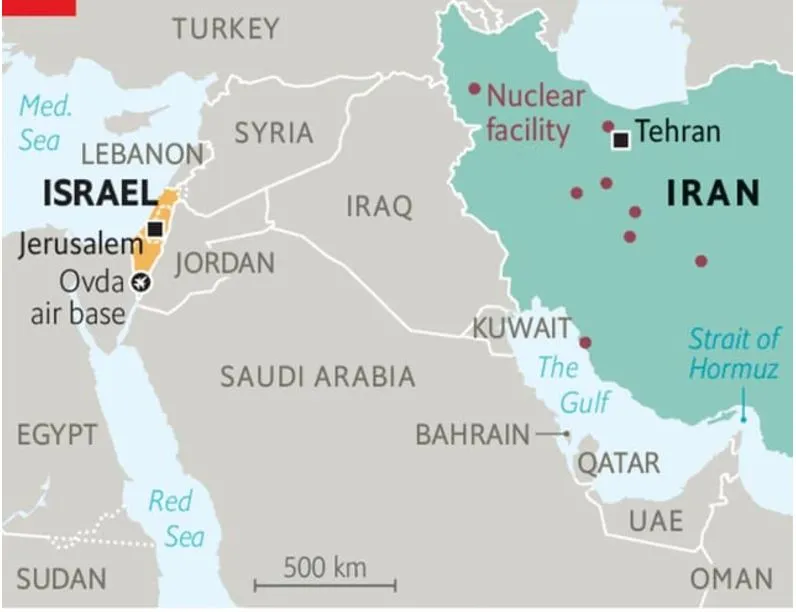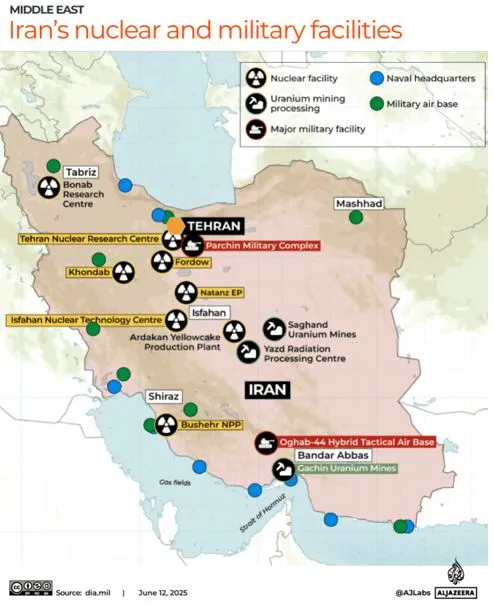

26th June 2025 (28 Topics)
Context
After 12 days of intense military conflict, a ceasefire was announced between Iran and Israel, bringing temporary relief to the volatile West Asian region. The situation had escalated dangerously with direct missile attacks, targeted assassinations, and the entry of the United States into the conflict.
Iran-Israel Conflict (Brief Background)
- Post-1979 Islamic Revolution, Iran adopted a hostile stance toward Israel, ending earlier diplomatic ties.
- Since then, Israel has accused Iran of secretly developing nuclear weapons and has reportedly carried out covert strikes on Iranian nuclear facilities.
- In retaliation, Iran has supported proxy groups such as Hezbollah (Lebanon), Hamas (Gaza), and the Houthis (Yemen)—collectively known as the “Axis of Resistance”—to launch attacks against Israel.
- In 2024, tensions sharply escalated:
- April: Israel bombed Iran’s consulate in Damascus, Syria, killing several personnel.
- July: Israeli airstrikes killed Hamas leader Ismail Haniyeh during his visit to Tehran and Hezbollah leader Hassan Nasrallah in Beirut.
- April & October: In response, Iran launched massive missile barrages at Israel, most of which were intercepted.
Who gained what?
- United States: US demonstrated military might by striking Iran's nuclear sites.
- It avoided casualties and chose not to escalate further after Iran’s retaliatory strike.
- It positioned itself as a peacemaker, showing strategic restraint.
- Politically, Trump avoided a prolonged war during an election cycle.
- It claimed victory by stating Iran's facilities were “obliterated.”
- Israel: Israel asserted air superiority by striking Iran’s key military and intelligence targets.
- It claimed the assassination of IRGC commanders, including top generals.
- It benefitted geopolitically by bringing the US into direct involvement.
- It gained domestic mileage ahead of elections for PM Netanyahu.
- Iran: Iran projected strength by retaliating against both Israel and the US. It managed to avoid a broader war through calibrated strikes with prior warnings. It retained domestic legitimacy by presenting itself as standing up to global powers.
- Despite damage, Iran denied major losses and emphasized “resistance.”
Iran’s nuclear and military facilities
- The UN’s nuclear watchdog, the International Atomic Energy Agency (IAEA), had accused Iran of enriching up to 400kg of uranium to 60 percent – not far below the 90 percent enrichment that is needed to make weapons.
Underlying Concerns
- The ceasefire is fragile. Uncertainty remains about the extent of Iran's nuclear damage.
- There are worries that Iran may accelerate nuclear development.
- Questions remain about Iran’s uranium stockpile and long-term regional stability.




